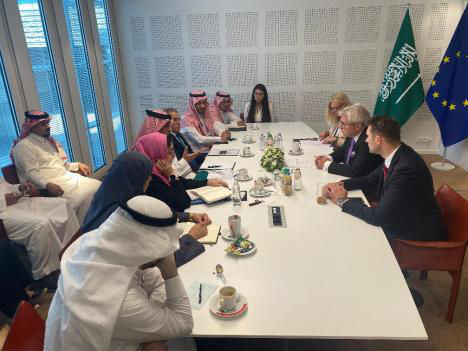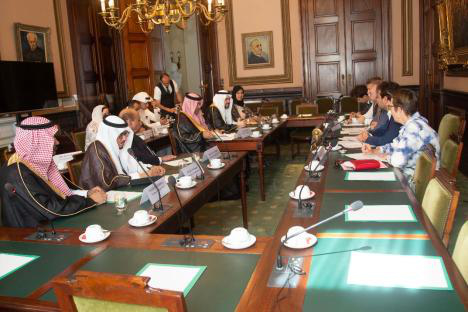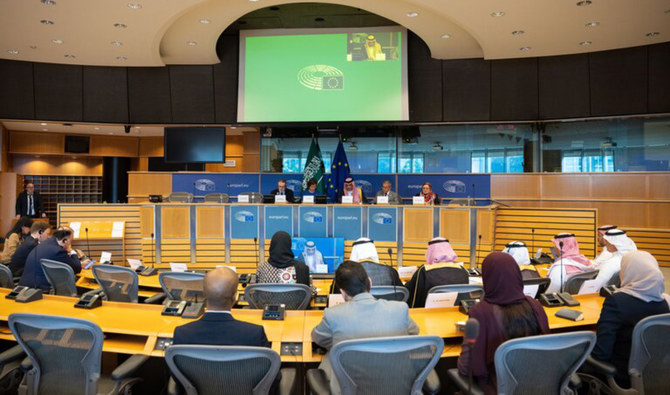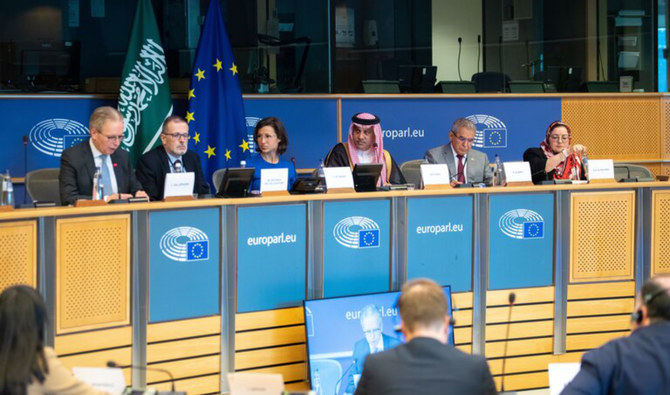RIYADH: The Shoura Council held the 15th parliamentary meeting between Saudi Arabia and the EU on Thursday, discussing opportunities to enhance ties and strengthen prospects for close cooperation.
The council’s Saudi Parliamentary Friendship Committee with the European Parliament, headed by Chairman Dr. Ayman bin Saleh Fadel, held the meeting with Hannah Neumann, head of the delegation for relations with the Arabian Peninsula in the European Parliament, at its headquarters in Brussels.
The meeting was attended by the head of Saudi Arabia’s mission to the EU Ambassador Saad bin Muhammed Al-Arifi and a number of members of the European Parliament.
Fadel praised the historical relations between the Kingdom and the EU, pointing out that there has been significant growth in trade exchange between the two sides, adding that he looked forward to further strengthening of relations.
He reiterated the Kingdom’s position on the current Russian-Ukrainian crisis, which aims to reach a comprehensive political solution to end the conflict as soon as possible.
Neumann stressed the importance of improving relations between the Kingdom and the EU, emphasizing the importance of giga-projects being worked on in Saudi Arabia, such as the NEOM city plans.
Shoura members also referred to the initiatives announced by the Kingdom for environmental preservation and the use of alternative energy.

Shoura Council delegation meets European Parliament members in Brussels. (Supplied)
The European Parliament noted the importance of strengthening cooperation between the EU and the Kingdom, stressing that exempting Saudi citizens from entry visas will have mutual benefits for the Kingdom and EU countries.
The meeting outlined the importance of finding a common vision toward the threats facing energy sources and oil supplies between Saudi Arabia and EU countries.
The meeting also discussed the Yemen crisis and other issues of common concern.
On Wednesday, members of the Saudi-European Parliamentary Friendship Committee visited the headquarters of the European Parliament and met with Chairman of the European Parliament’s Foreign Affairs Committee David McAllister.
During the meeting, Fadel said that Saudi Arabia’s fight in Yemen is against terrorist militias, working to stop terrorist attacks that target civilians areas and oil facilities in the Kingdom. He added that the Kingdom is seeking a political solution in the country to achieve security and peace for the Yemeni people. McAllister noted the hostile Iranian behavior in the region.
Members of the Saudi committee presented the Kingdom’s efforts in combating terrorism and its role in deterring terrorist militias that undermine security in the region and threaten maritime traffic and global oil supplies.
The delegation further stressed Saudi Arabia’s position in support of dialogue to reach a comprehensive political solution to the Ukraine crisis and its readiness to provide efforts for this purpose. They highlighted the recent understandings reached between Crown Prince Mohammed bin Salman and the Russian and Ukrainian presidents.
Earlier on Tuesday, the Shoura Council’s Saudi-Belgian Parliamentary Friendship Committee, also headed by Fadel, met with Samuel Cogolati, vice-president of the foreign affairs committee of the Belgian Federal Parliament, and Belgian MP Peter De Roover at the headquarters of the parliament in Brussels.
Cogolati pointed out the danger posed by armed terrorist militias in the region, in light of the repeated attacks against Saudi Arabia and international shipping routes and their impact on oil supplies, praising the Kingdom’s role in combating these lethal attacks.

Saudi-Belgian Parliamentary Friendship Committee meets with Belgian MPs. (Supplied)
The Saudi Ambassador to Belgium and Luxembourg Dr. Khalid bin Ibrahim Al-Jindan and members of the Saudi-Belgian Parliamentary Friendship Committee Dr. Khalid bin Mahmoud Zubair, Raeda bint Abdullah Abu Nayan, Dr. Mutaib bin Ayed Al-Mutairi, Dr. Hadi bin Ali Al-Yami and Huda bint Abdulrahman Al-Helisi also attended the meeting.
Abu Nayan and Al-Helisi held a meeting with Belgian MP Goedele Liekens at the parliament’s headquarters, discussing the role of women within the Kingdom’s Vision 2030 reform plans.
They covered Saudi Arabia’s guarantee of women’s rights and empowerment, especially with regard to regulations and the Shoura Council’s legislative role in advancing women’s interests and rights.




































